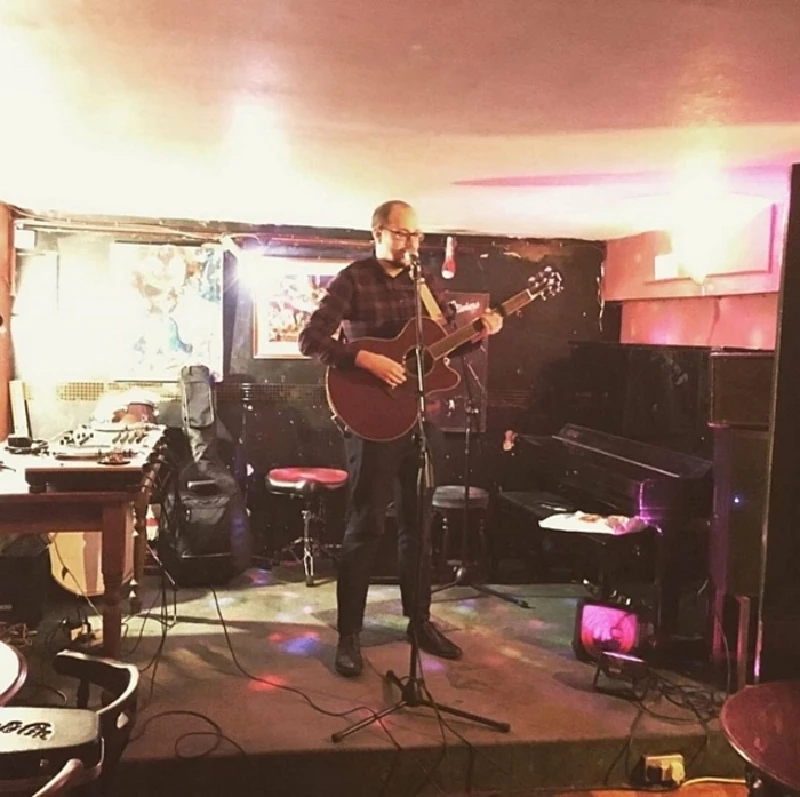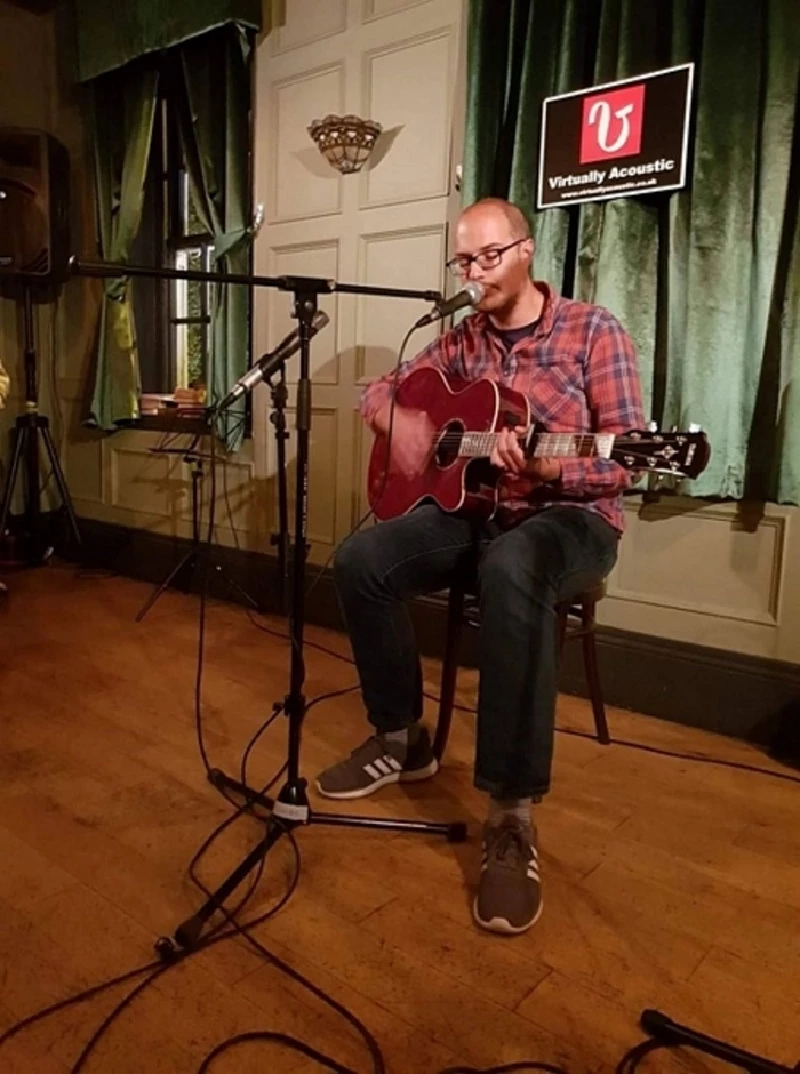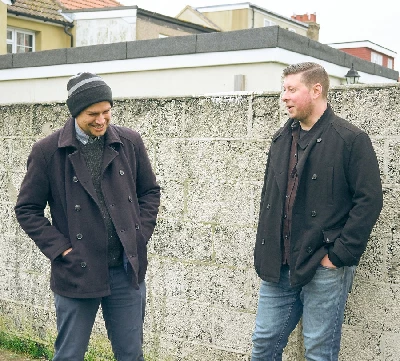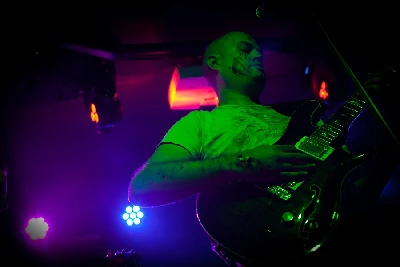Volunteered - Interview
by John Clarkson
published: 27 / 5 / 2020

intro
John Clarkson speaks to Mark Rowland, the frontman with London indie band The Volunteered, about his band's growing line-up and sound and their second EP ‘We All Fall Apart’.
When Pennyblackmusic last spoke to London-based singer-songwriter Mark Rowland about his part-solo project The Volunteered at the end of 2018, it was only a few months old and had just released its first EP, ‘We Don’t Listen’. Returning for a second interview with him, we find The Volunteered in the process of expansion. Mark, who has played all Volunteered shows to date acoustic and solo, is in the process of building the line-up for gigs when lockdown restrictions are lifted to incorporate other members. For The Volunteered’s new EP ‘We All Fall Apart’, which will be available digitally from June, Paul Webber, Mark’s former bandmate in his last group Partisan Waves, once again appears, blending out Mark’s acoustic guitar and bass with his own electric guitar and percussion. ‘We All Fall Apart’ maintains some of the indie folk sound of its predecessor but also builds far beyond it, and, showing an increasing confidence, runs to six songs rather than just four. It begins with ‘Bless the News’, which combines a melancholic Americana tune with what sounds like a brooding vintage synth line and the sinister opening lines of “Spiders in my blood/Feels like the old days.” ‘Old Life’ involves just two electric guitars and drums, but due to layering sounds much more expansive. ‘Going to Amsterdam’ is a noise rock number which features a guest appearance from Simon Berridge of durable London indie band Bromide on additional guitar and closes in a mass of fuzzy distortion. ‘Something New’ – the closing track and another highlight – is balladic, and, featuring a fluttering piano, closes ‘We All Fall Apart’ on a note of real tenderness. Pennyblackmusic spoke to Mark Rowland about The Volunteered’s growing line-up and sound and ‘We Fall Apart’. PB: When we last spoke to you in late 2018, The Volunteered was a part-solo project which consisted of you and Paul. The line-up has recently expanded. Why did you want to build on the line-up and who else is involved these days? MR: The majority of the songs on our new record ‘We Fall Apart’ feature just me and Paul. We've just got better at self-recording, and we've got a bit braver with our arrangements. The line-up is primarily expanding so that we can play better shows. It's always been me on my own so far, which is fine, but I like playing with other people live. It's more fun. Liz Sadzik has recently joined the band on piano and flute – she is a brilliant musician and has really added to the songs. She plays on the new record on ‘Something New’. I will be getting a rhythm section involved at some point, but the live sound we've got at the moment is pretty great, though different to the recordings, so I'm in no rush. PB: You have said that this new EP is "100% not a concept record" but many of the songs are about climate change. Did you set out to do that intentionally or was that something which simply evolved? MR: Paul had a good insight on this – it's often hard to see these things when it's your own songs. He said that while the old songs were all about coming to terms with the past, these are all about looking to the future, and I think he's right. I think having a theme makes it a more cohesive listen, but I would still draw the line at calling it a concept record. I'm not necessarily trying to tell a broader story, although I have got no issues with people reading it like that. PB: Why do you think that you have made this dramatic jump from writing songs about the past to songs about the future? What has prompted that? MR: I've spent quite a lot of time coming to terms with the past, understanding why I'm prone to extremely crippling anxiety. I think in recent years I've made my peace with it. My anxiety is much more under control and I know where it comes from. Becoming a parent also changes your perspective. My worries these days are focused on the kind of future that might be available for my son when he grows up. Climate change is, therefore, something I care about – I've made some fairly big changes to my lifestyle to help reduce my own carbon footprint. It worries me that people don't take it that seriously. We've seen with this pandemic that human beings are terrible at assessing risk when the threat seems too big – hence all those people still flocking to beaches and public places at the first opportunity. Climate change is even bigger than COVID-19, so it's no wonder people are so reluctant to change. But it is an existential threat. It doesn't surprise me that my frustration at inaction might filter into the songs PB: The opening track ‘Bless the News' strikes a balance between Americana and electronica. It is fairly melancholic and reflective in tone. What inspired that track? MR: ‘Bless the News’ is essentially about an anxiety attack. I’ve dealt with my anxiety disorder for years (and for most of that time I was unaware I had it), but, while for the past five years I’ve had it under control. It sometimes still rears its ugly head, and last year, when I felt close to burning out, I started losing control of it a little. That was the inspiration for that song. The opening line “Spiders in my blood/Feels like the old days” is specifically about feeling your anxiety rising - I wanted an evocative visual that summed up how anxiety feels. The electronic sounds you hear is a Mellotron (well, a mellotron emulation - I’d kill for a real mellotron). You hear that sound on a lot of 60s psychedelic stuff, so in a way it’s quite traditional electronics! I don’t think you can completely lose the digital feel when you’re using a digital sound, so it probably has a more modern feel than a real mellotron would. I think I probably went with the mellotron because Mark Linkous of Sparklehorse used it a lot, and I’ve always liked the slightly off sound of it. I think it suits a melancholic song. PB: ‘Old Life’ uses a limited amount of instrumentation but has an enormous, echoing, cavernous sound. How did you achieve that? MR: A lot of that is down to Paul’s layering of guitars. Originally, this song was in 3/4 time, but Paul had the idea of turning it into a 4/4, country-rock song, and I was into it. He’s really excelled himself when it comes to guitar harmonies on this EP. I also kept my part at the low end of things, which helps thicken it a little. But it’s really all down to Paul. PB: Going to Amsterdam' with its chorus lines of "Let's get out while we still can/There is nothing here to hold us back" could be about a couple getting out of the rat race and going somewhere different. It could be about the more universal issue of saving the planet, especially with the line of "It's not too late to make a change." Was that your intention to keep it open-ended? MR: I definitely try to keep things open so that people can interpret them the way they want to. I think it helps them be more relatable. ‘Going to Amsterdam’ came out of a couple of things – my friend Andy Simmonds-Elliott, who was in Das Wanderlust and Council Tax Band, challenged me to write an upbeat, two-and-a-half-minute song. We talk about songwriting a lot and I'd been writing a lot of longer songs before then. When writing it, I decided to pay a small tribute to The Mountain Goats by writing a song about travelling somewhere – John Darnielle has a whole series of songs that are 'Going to...' and somewhere. He hadn't done Amsterdam, so I thought that was safe to do – we were thinking of going on holiday there. Then I think my thoughts about an uncertain future snuck in there too. Once I got the melody for the first line of the verse, it all sort of clicked into place. PB: There is an amazing distorted sound about two thirds the way through ‘Going to Amsterdam’. How did you achieve that? MR: Paul puts a lot of effort into the sounds he uses and spent a while picking the right fuzz sound for this track. That was a very punk rock recording. Simon Berridge from Bromide rocked up to my house with his guitar and a fuzz pedal. We plugged it into a cheap practice amp and draped a cheap mic over it, and he went through his solo. We recorded it twice, and panned both takes left and right, to give it something extra. It’s an unusually fuzzy song for us, but maybe on the evidence of this we should be whipping the fuzz out more often. PB: Who shares vocals with you at the end of that song? MR: The singers at the end are me, Simon, and a couple of Soundcloud friends - René from a German indie band called Para Lia, and Cody Ketchum, who writes Big Star-sequence songs under the name Shmogy. I wanted to include more people but we ran out of time. Also it crashed our recording software with this many, so it’s probably for the best it’s not any more people. PB: 'Something New' is about not being strong enough or powerful enough to change things for the better for a loved one. It could also be interpreted as another ecological song. Was that written for your wife Sarah and son Dylan? MR: Yes, it was written for my family. In particular, it's about the anxiety of seeing your child grow up in an uncertain world, knowing you've got to let go of them at some point, but unsure about what you'll be releasing them into. It's because of my son that I take climate change more seriously. I became a vegetarian to do some small part towards improving the world for him. I know it's all a bit fruitless, but you have to do something. PB: Liz's piano really builds that track. How do you, Paul and her record that track, independently or together? MR: Liz's part really brings ‘Something New’ to a new level. I'd done a very rudimentary part before that – I'm glad we were able to get an actual pianist to give it a shot! Liz came up with the part during our first rehearsal, before the lockdown. It didn’t take long to come up with, and between the three of us, we worked out when it should come in and how the track might build. It was all very spontaneous. We'd completed most of the EP before Liz came aboard, but I had to include that piano part. Liz actually recorded it into her phone and sent it over during lockdown, which gives it a nice, slightly lo-fi quality. PB: What are your plans beyond the EP? MR: My main aim is to expand the line-up so we can play a mix of stripped down sets and shows that are closer to the recordings. Otherwise I just want us to keep improving - this EP is a giant leap forward compared to the first one (which was a little rushed). The next one will hopefully be another leap forward - if we aren’t getting better all the time, there’s not much point in keeping it going. PB: Thank you.
Band Links:-
https://thevolunteered.bandcamp.comhttps://www.facebook.com/TheVolunteeredMusic/
https://twitter.com/TheVolunteered
Play in YouTube:-
Picture Gallery:-

interviews |
|
Interview (2022) |

|
| Mark Rowland, the frontman with South London indie band The Volunteered, talks to John Clarkson, about its debut album 'We Fall Apart', which has expanded from an EP into a vinyl LP, and the change in its line-up from a duo into a five-piece group |
| Interview (2018) |
photography |
|
Photoscapes (2024) |

|
| Marie Hazelwood takes photos of indie band The Volunteered at our 25th Anniversary gig at The Water Rats in London. |
most viewed articles
current edition
Carl Ewens - David Bowie 1964 to 1982 On Track: Every Album, Every SongBathers - Photoscapes 1
Armory Show - Interview with Richard Jobson
Colin Blunstone - Thalia Hall, Chicago, 16/7/2025
John McKay - Interview
Visor Fest - Valencia, Spain, 26/9/2025...27/9/2025
Billie Eilish - O2 Arena, London, 10/7/2025
Bathers - Photoscapes 2
Editorial - July 2025
Sir Tim Rice - Interview
previous editions
Heavenly - P.U.N.K. Girl EPOasis - Oasis, Earl's Court, London, 1995
Trudie Myerscough-Harris - Interview
Pixies - Ten Songs That Made Me Love...
Simon Heavisides - Destiny Stopped Screaming: The Life and Times of Adrian Borland
Beautiful South - Ten Songs That Made Me Love...
Prolapse - Interview
Blues and Gospel Train - Manchester, 7th May 1964
Boomtown Rats - Ten Songs That Made Me Love....
Doris Brendel - Interview
most viewed reviews
current edition
Amy Macdonald - Is This What You've Been Waiting For?Sick Man of Europe - The Sick Man of Europe
Alice Cooper - The Revenge of Alice Cooper
Phew, Erika Kobayashi,, Dieter Moebius - Radium Girls
Lucy Spraggan - Other Sides of the Moon
Blueboy - 2
Cynthia Erivo - I Forgive You
Davey Woodward - Mumbo in the Jumbo
Lapsley - I'm a Hurricane, I'm a Woman In Love
Philip Jeays - Victoria
Pennyblackmusic Regular Contributors
Adrian Janes
Amanda J. Window
Andrew Twambley
Anthony Dhanendran
Benjamin Howarth
Cila Warncke
Daniel Cressey
Darren Aston
Dastardly
Dave Goodwin
Denzil Watson
Dominic B. Simpson
Eoghan Lyng
Fiona Hutchings
Harry Sherriff
Helen Tipping
Jamie Rowland
John Clarkson
Julie Cruickshank
Kimberly Bright
Lisa Torem
Maarten Schiethart